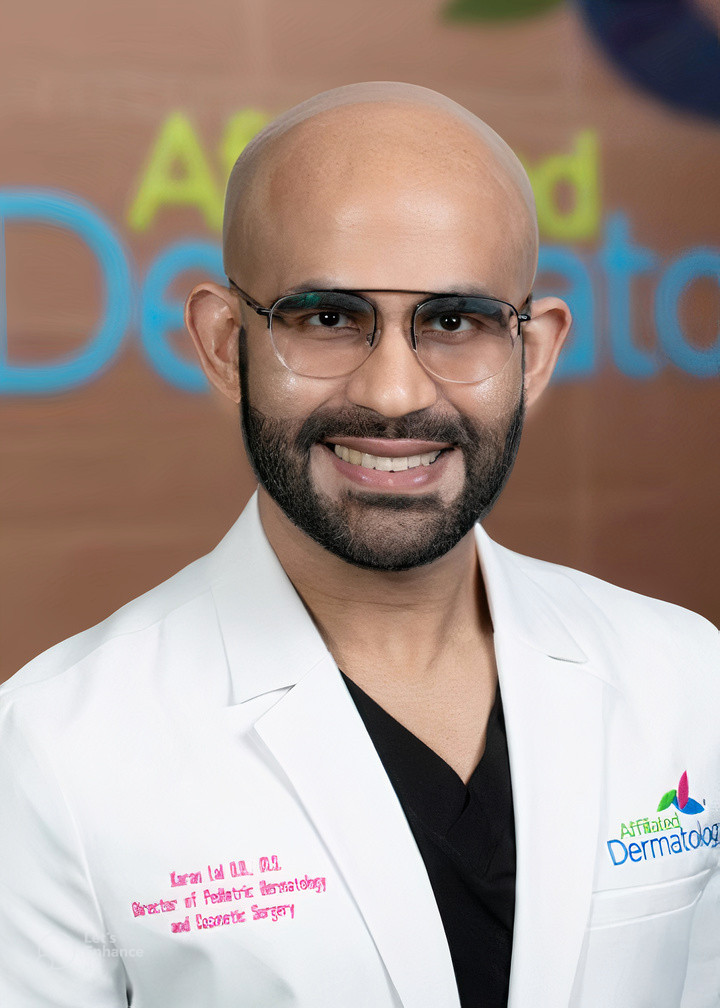By Dr. Karan Lal, Director of Pediatric and Cosmetic Dermatology, Affiliated Dermatology
Psoriasis is a skin disease that can cause a rash with itchy, scaly patches. It has no cure and can go through cycles of flaring up. Psoriasis affects more than 3% of the US adult population, making it a common skin condition*. However, this disease does not present the same for all who live with it. Psoriasis may occur in many places, with a multitude of symptoms, and require different approaches to treatment.
August is National Psoriasis Month, and the below article will provide insight on the common skin condition, treatments, and misinformation.
Different Kinds of Psoriasis and How it Affects Individuals Differently
There are five main types of psoriasis, the most common being plaque psoriasis. This type presents as raised, red patches that are covered by silvery-white scales. They are symmetrical and most commonly appear on the scalp, trunk, and limbs. Guttate psoriasis is typical in children and young adults and present as small red dots on the torso or limbs. Guttate psoriasis is triggered by an upper respiratory tract infection.
Pustular psoriasis is one of the less common types of psoriasis and consists of pus-filled bumps surrounded by red skin. It usually impacts the hands and feet. Inverse psoriasis appears as smooth, red patches in folds of skin prone to sweating and increased friction, such as in the armpits. Finally, there is erythrodermic psoriasis, which is rare but presents as red, scaly skin over most of the body. This form of psoriasis can evolve from rashes in people who have a different form of psoriasis that is not well controlled.
Treatments That Help Flare-Ups and At-Home Remedies
There are many different forms of treatment, though the three most utilized involve topical, phototherapy and systemic approaches. Topical treatments most commonly feature steroid creams and ointments applied directly to the rash site. For those who have it on their scalp, topical treatment may consist of a shampoo and conditioner. Phototherapy uses both natural and artificial light to treat the condition and is usually administered by a dermatologist. The light is most commonly ultraviolet B and Psoralen plus ultraviolet A. Finally, systemic treatment consists of prescription drugs that work throughout the body.
However, not everyone may want a medical solution for psoriasis, and instead might explore home remedies like warm baths, aloe vera, and omega-3 fatty acids. Adding Epsom salt, mineral oil, or colloidal oatmeal to a warm bath assists with soothing the skin. Aloe Vera also calms the skin and reduces discoloration, scaling, itching, and inflammation. Diet influences the presentation of psoriasis and consuming Omega-3 fatty acids can reduce systemic inflammation, which may be the cause of the itchy discolored flakes.
Misinformation Surrounding Psoriasis
One thing you may hear is that it is just dry skin, but that isn’t the case. The body creates skin cells at an increased rate that doesn’t allow adequate maturation, resulting in thick scales. In addition, blood vessels also change and move closer to the skin surface, and if scratched can make it bleed, red, and sore.
Another misconception is that psoriasis results from poor hygiene. As people with psoriasis are aware, this type of sore, flaky skin requires near constant care, leading the patient to be diligent about their personal hygiene and use of products.
If you are concerned about your skin or experiencing any aspect of psoriasis, it is best to visit your local dermatologist. However, whether you have it or know someone with this condition, this information will help all individuals find relief.

*Psoriasis Prevalence in Adults in the United States – PubMed (nih.gov)
About Affiliated Dermatology
Physician owned and operated, Affiliated Dermatology® provides an unmatched patient experience to Arizonans. Founded in July 2002 by Dr. Richard L. Averitte, Jr., Affiliated Dermatology®️ is a full-service dermatology group with nine locations providing skin cancer prevention and treatment, medical and aesthetic dermatology services, and allergy testing. Our team is committed to inspiring and empowering you to make educated, healthy decisions about skincare.
Read more Health and Wellness articles on Green Living.






